Brazil
Contents :
- Introduction
- Brief history of Brazil
- Account of our trip
- Photos
- Thanks
- Portuguese songs
- Celebrai a Cristo
I am now back from our mission to Brazil, and over the coming weeks reports and pictures from the trip will appear here.
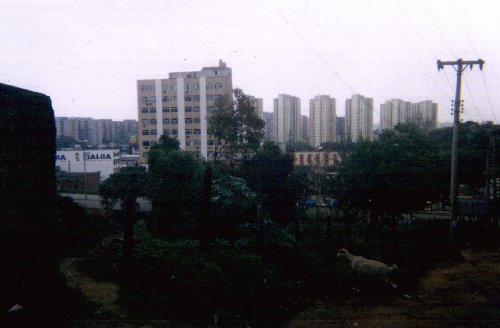
The above picture is where we stayed in Rio de Janeiro, across the bay to Niterói and up inland a bit, to the area of Alcântara. You can see tower blocks, a dirt road with a goat nibbling at some nearby grass, and in the distance a McDonald's sign. The golden arches get everywhere.
History
For those of you who don't know much about the place, here follows a short history of Brazil. I wrote it myself, so do forgive any mistakes I may have made : indeed, please point any out to me!
It is believed that when people first migrated across the Bering Straits of Alaska about 20,000 years ago, some continued down the continent of America. The native American people came from this group from Asia - and so, probably, did the indigineous inhabitants of Brazil. They settled in the rainforests and became completely independant and self sufficient. When the Portuguese explorers first discovered Brazil, there were an estimated two to five million native Indians in the territory. Today there are fewer than 200,000. The European philosophical concept of the "noble savage" may have been influenced by this self-sufficiency and form of communism - they lived together in long huts, hunted and cooked together. However, they were also fighters and, after tribal battles, captured prisoners were ceremonially killed and eaten.
Following the trailblazer Vasco de Gama's directions, Pedro Cabral sailed from Lisbon in 1500 bound for India. He sailed with 13 ships and 1200 men, on a south-westerly course. He landed at Porto Seguro on the 22nd April. A cross was built and the first Christian service held in the land they called "Terra de Vera Cruz" (Land of the True Cross). After only a short stay, Cabral returned, taking some pau brasil (brazil wood) which produced a red dye, and left behind some convicts to learn the Indians' ways. The lack of riches in Brazil persuaded the Portuguese to set up colonies in India and Africa, rather than Brazil. However, a few merchants were interested in the red dye, and started to export a few shiploads annually to Portugal. In the mid 16th century, the name of the colony was changed to Brasil, after the wood, and the French started taking areas by force, provoking fighting.
The first official settlement was sent in 1531, and landed at Sao Vicente, near the present day port of Santos. The King wanted Portuguese nobility to settle in Brazil, but they were more interested in the riches of Asia and India, so Brazilian estates were given to the upper-middle classes of Portugal, who lacked the means to overcome the obstacles of settlement. Of the 12 "captaincies" - the tracts of coastline given by the King to the settlers - only 2 were profitable. The others were plagued by hostile Indians, the tropical climate, and competition from the French and Dutch. In 1549 the King sent a governor to centralise authority, to rule from Bahia. It reamined capital until it was transferred to Rio in 1763.
Soon the colonists found that the climate and fertility of the land were ideal for growing sugar cane, which was highly sought after by the European market. All that was needed were workers, so the settlers tried to capture and enslave the local indigineous population. The slave trade soon became the second most profitable enterprise in Brazil. Bandeiras, groups of bandits, scoured the unexplored interior of the country for natives to sell. The name bandeiras means flag, because each group had a different one as an indentifier. By the 1550s, however, the richers sugar plantation owners began to buy African slaves instead of local Indians, because they worked harder and were more immune to European dieseases. Thus the "Triangular Trade" profited Brazil as well as the Carribean islands. During the 300 years that the slave trade was active, about 3,500,000 Aficans were shipped to Brazil - over 1/3 of the total that came to the New World. Catholicism was compulsary, but as many slaves brought religeous practices from Africa, many elements combined to form new religous orders, mixing many ideas including the Catholic saints. These evolved over time to become the modern day cults of Macumba and Candomblé.
The average settler in Brazil from Portugal came through choice, because there were no over-population problems, nor agricultural policies that forced the lower classes to emigrate. Even the poorer settlers had a slave or two to do their work. Sexual relations between master and slave were very common, white women very rare, so began to grow a population of mulatto - mixed race - people. Even the church favoured these relationships - it was important to grow a large settler population.
The French and Dutch repeatedly tried to take Brazil by force, indeed, the Dutch took the capital Bahia in 1624. However, after bloody fighting, it was recaptured by the Portuguese the next year. Even though a treaty with Spain had divided exclusively the New World between them, other powers kept open their interest.
Gold, more than anything else, was the reason that so many people came to the New World, in search of the lost city of El Dorado. Of course, it was never found, but gold reserves were found in the state of Minas Gerais, prompting a gold rush in the 1690s. Before gold was discovered there, there were no white settlers in Minas, but a century later there were over half a million. Towns sprang up, fuelled by the rush for gold. Crime, drinking and prostitution ruled the streets, but still a number of exquisite Baroque churches were built. The population grew into a mulatto people, because of the lack of white women. After the rush ended, the huge immigration declined, and many people moved back to the coast from the interior, often to Rio with its prosperous ports.
When Napolean's army marched on Lisbon in 1807, the Portuguese court left and sailed to Rio. After the Allied victory in 1815, the King stayed and declared Rio the capital of the United Kingdom of Portugal, Brazil and the Algarves. This was the first and only time a European country has been ruled from the New World. Five years later, however, he was politically forced to return to Lisbon, and so left his son, Pedro, as prince regent. In 1822, Pedro pulled out his sword and shouted, according to legend, "Independendência ou morte!" - "Independence or Death!". Portugal had to relent, and Pedro made himself Emporer Dom Pedro I.
In 1889, the Emporer Dom Pedro II was overthrown by a military coup, and before long republican elections were held. This made little difference, apart from giving the military even more power.
Slave revolts were feared by the landowners, who then treated their slaves even more harshly. Insurrections were common, until slavery was finally abolished in 1888 (80 years after Britain, and 25 years after the USA).
Coffee, now one of Brazil's main exports, was not introduced until the early 18th century. As sugar exports dropped, so coffee rose, to become even more important to the economy.
The republic continued without much to note until 1956, when Juscelino Kubitschek was elected president. His main aim was to increase productivity. This he did, creating an 80% rise in industrial production, which was close to his motto of "50 years' progress in five". However, his critics responded with "40 years' inflation in four", which was also true. He encouraged the start of Brazil's motor industry, and built a new capital city, Brasília. After another couple of presidents, yet another military coup took place as the Revolution of 1964. This time, the regime was not as brutal as those of Chile or Argentina, but political oppostion and freedom of speech were outlawed. However, industrial production continued to grow. Fuelled by middle class strikes in the car factories of São Paulo, the military governement announced the abentura - the opening - that is, the gradual return to civilian rule. However, inflation was severe and debts were huge.
In 1994, after years of massive inflation and numerous changes of currency, the "Plano Real" was started - to try to finally stablize the currency. The year was emotional for Brazilians : after the death of Ayrton Senna, the national team won the World Cup. And so now the real is the national currency, and is fairly stable on the world markets.
Hereby follows a report on what actually happened, and some extracts from my diary (signified by the date followed by the place - for example like the paragraph below).
19/7 - Heathrow
Finally here, after a long time fundraising, jabs, etc. To be honest, my only worry is for Mum - she'll be worried stupid until I get back! No, I'm just anxious to see how it will be. A new place, very different from anywhere I've been before. Not worried, more impatient. Maybe I am worried about one small thing : I don't understand Portuguese. (...) A lingering doubt, because Liz won't be with us - the only one who's been to Brazil before. Still, we'll manage.
After a long coach ride and six hours wait at the airport, we finally checked in. The wait because Mum had said that it would be better to be early than late. And even then roadworks on the M25 caused the coach to be stuck in traffic for an hour, at midnight. It was good to see some of the others - Andy, Helen and Sandra - when their coach arrived from Birmingham at 4am. Vicky and Nicky live in the London area, so they actually got some sleep!
We checked in ok, and then went to wait for the aircraft. We were due for a 2 hour wait in Madrid for our connection. However, the plane from Heathrow was 2 hours late - arriving in Madrid at the exact same moment our onward flight to Rio was due to leave. The departure boards and the information desk said nothing - they didn't know anything. Our lack of understanding of Spanish didn't help. Prayer was appropriate at this point. However, someone told us that the Rio flight was delayed too - for an unspecified time. Hmm. We were also told that Iberia were providing food. We went to a different part of the airport and were treated to a 3 course meal, with wine, in what looked like a purpose built cafeteria. We now know that Iberia must be well used to "entertaining" delayed passengers. We managed to 'phone Cacio (who was going to meet us at Rio airport) to tell him that we'd be about 2 hours late (we thought we would be at that point) but we ended up being about 5 hours late.
My first impression of Brazil was, obviously, within the airport. It looked much the same as most, but perhaps with more bare concrete. It seemed to be built for function rather than style, which is good, I think. After meeting Cacio, he and a friend from church drove us back to his house. He and his wife Hildely have a small house in Alcântara, across the bay and inland a bit from the city centre. It was down a short alley off a dirt road, and looked fairly run down - plaster on the walls, etc. They live upstairs and leave the downstairs empty for numerous visitors. Inside their part was surprisingly comfortable - all the mod cons, TV, phone, cookers, fridge, PC, and so on. Downstairs was completely empty - we slept on the tiled floor.
 This is the team that went to Brazil, except of course me, who took the photo. From the left : Sandra, Helen, Nicky, Vicki and Andy.
This is the team that went to Brazil, except of course me, who took the photo. From the left : Sandra, Helen, Nicky, Vicki and Andy.
We spent that first week there, going to church almost every evening, speaking, singing songs and doing dramas. Our first drama we thought surprisingly poor. It was in front of about 20 people in a new church, only recently set up, with which Cacio's church has links. We played the parable of the Prodigal Son, and we later learned that a woman had been so moved by it that she came back to Christ that night. Another day, we gave a seminar in Cacio's church about "Mission", which was great because we'd been in the country only a few days and had no preveous experience of it. However, with God's help, we spoke about various connected themes, including comfort zones, Western life and the Church in England. Cacio translated for us. Once again, it was a success.
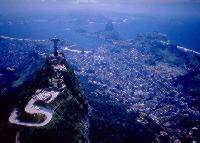 Whilst in Rio, we had a day "off", to go into the city centre to see the sights. We got the bus from Alcântara to Niterói, and had lunch there. It is very much a real Brazilian town, unlike Rio itself, which caters for more tourists. After getting the ferry across to Rio, we decided to go up Corcovado, the mountain upon which is the Christ statue.
Whilst in Rio, we had a day "off", to go into the city centre to see the sights. We got the bus from Alcântara to Niterói, and had lunch there. It is very much a real Brazilian town, unlike Rio itself, which caters for more tourists. After getting the ferry across to Rio, we decided to go up Corcovado, the mountain upon which is the Christ statue.
 As you can see, at the top of Corcovado, the mountain upon which the Christ statue is, it was a bit cloudy. The head would occasionally appear and disappear. It was quite moving.
As you can see, at the top of Corcovado, the mountain upon which the Christ statue is, it was a bit cloudy. The head would occasionally appear and disappear. It was quite moving.
 Here is the new World Horizons mission building, which is being built in Monte Verde, Minas Gerais, completely with donations and volunteer help.
Here is the new World Horizons mission building, which is being built in Monte Verde, Minas Gerais, completely with donations and volunteer help.
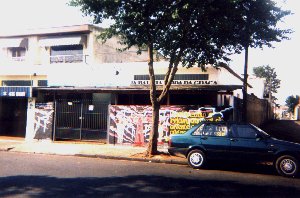 Here is a church in Santo André - you can just about make out the words Igreja baptista, "Baptist Chruch", on the white board above.
Here is a church in Santo André - you can just about make out the words Igreja baptista, "Baptist Chruch", on the white board above.
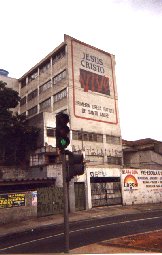 Here is another Brazilian church.
Here is another Brazilian church.
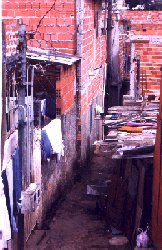 This is an area in one of the favelas, or slum areas, in São Paulo. Some of the children came from areas like this.
This is an area in one of the favelas, or slum areas, in São Paulo. Some of the children came from areas like this.
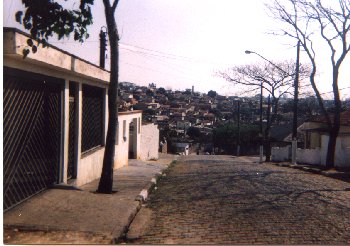 This is the area in São Paulo where the house is, called Santo André. It's just down the hill and to the right a bit.
This is the area in São Paulo where the house is, called Santo André. It's just down the hill and to the right a bit.
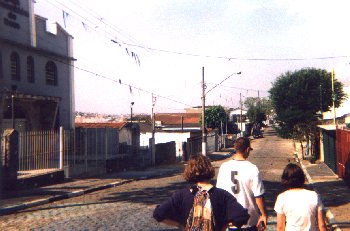 This is also in the area - we are just walking down to the shops. See the open electric cables.
This is also in the area - we are just walking down to the shops. See the open electric cables.
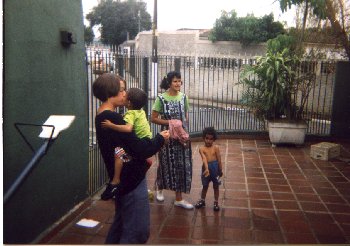 This is Sonia, the lady who runs the Halfway House, with Vicki, one of our team. Vicki is holding little Tiago, and Raphaella is also in the picture.
This is Sonia, the lady who runs the Halfway House, with Vicki, one of our team. Vicki is holding little Tiago, and Raphaella is also in the picture.
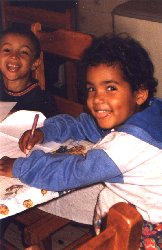 Here are Deusiani and little Tiago hard at work with their school homework!.
Here are Deusiani and little Tiago hard at work with their school homework!.
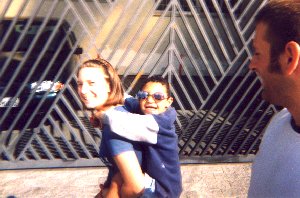 Here is Nicky with Tadeu.
Here is Nicky with Tadeu.
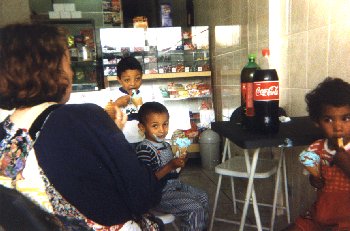 This is when we took the children out for an ice cream. Just look at their little faces - especially Tiago's!
This is when we took the children out for an ice cream. Just look at their little faces - especially Tiago's!
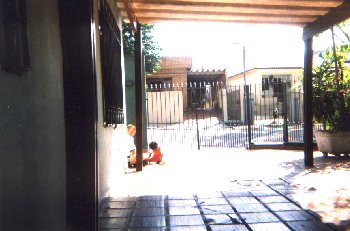 This is Andy in the yard of the house.
This is Andy in the yard of the house.
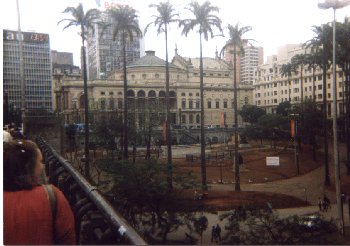 As I said before, São Paulo is the more European of the two Brazilian cities we visited. Here is one of the main squares, with the ornate Theatro Nationale (National Theatre).
As I said before, São Paulo is the more European of the two Brazilian cities we visited. Here is one of the main squares, with the ornate Theatro Nationale (National Theatre).
 Here we all are at the Halfway House, with a couple of additions!
Here we all are at the Halfway House, with a couple of additions!
There are so many people and organisations I'd like to thank for helping me in so many ways to enable the trip to take place. They are :
- Wally, of the Royal British Legion, and also for his help in a personal capacity ;
- Margaret, of the Royal British Legion Women's Section ;
- Dick Bass, of the Reedham Gardening Club, and Reedham Football Club ;
- Kathy and Ivor from the Railway Tavern ;
- Vera, of the Monday Night at Eight group ;
- Fred from the Briar Tea Room ;
- Rev. Ray Gibson ;
- Alice from the W.I. ;
- Mary from the Mothers' Union ;
- Jean from the Older Residents' Club ;
- Dr. Ireland and Janet from the Surgery.
The following companies also helped me, in either donations or providing prizes for our fundraising events :
- Reedham Fish and Chip Shop ;
- Marina Centre, Great Yarmouth ;
- Theatre Royal, Norwich ;
- Solar Skate, Norwich ;
- Roys of Wroxham ;
- Norfolk Lavender; < li>The Body Shop, Norwich ;
- Lathams of Potter Heigham ;
- Norwich Union ;
- Pleasure Beach, Gt. Yarmouth ;
- McCarthy (Fruit and Veg), Gt. Yarmouth ;
- R. C. Snelling, Blofield ;
- Barclays Bank, Acle ;
- East Anglian Transport Museum, Carlton Colville, Lowestoft ;
- Thursford Steam Museum ;
- Kings Casino, Gt. Yarmouth;
- Hoseason's Holidays, Lowestoft ;
- Thrigby Hall (Animal Park) ;
- Kurzner Enterprises (Hy's Nightclub, Pizza One Pancakes Too!), Norwich ;
- Halifax (London St.), Norwich ;
- Broadland Wineries, Cawston ;
- Bretts Furniture, Gt. Yarmouth ;
- Bertram Books, Norwich ;
- Cumpstey's Butchers, Acle.
Many thanks must go to everyone in my village of Reedham for supporting me - I really appreciate the Quiz Night, which raised money for our group. The Easter Raffle, for a huge Easter chick, was won by Sharon Barber in the village. The raffle raised about £60 for the group.
The All Prize Bingo, which was held in the Vikings club on 12th May, also made lots of money for the group. Thanks must also go to everyone who helped, came along, and donated prizes.
I also did a sponsored walk, the same day, from Birmingham to Kidderminster (the same distance as Coventry, but a much nicer walk). We (thanks to Sam and Kris who came as well) walked 21 miles or 34.5km, and raised over £35.
And I would espeially like to thank Wally and Dick, and the members of the Royal British Legion, who worked so hard in helping me to rais this money. I was presented with a cheque for £1000 at the Railway Tavern on Sunday. This sum includes all the money raised from the Quiz, the Bingo, the Raffle, the Walk, and many kind donations from people in the village. I, and the other members of the group, thank you so much for your kindness and help.
And my arm still hurts after having 18 needles stuck in it, so far (including 6 at once, in the TB "Heaf" test). Additional note : I've now had all the necessary injections! No more until November - when I will have some boosters, so they remain effective for 10 years.
This is a song, in Portuguese, that we will (try to) learn, to sing with the children (more will appear soon!) :
Celebrai a Cristo, Celebrai
Celebrai a Cristo, Celebrai
Ressuciteu, Ressuciteu
E Heji Vivi, para Sempre
Vamos Celebrar (Hey)
Vamos Celebrar (Ho)
Vamos Celebrar
Ressuciteu Meu Senhor.